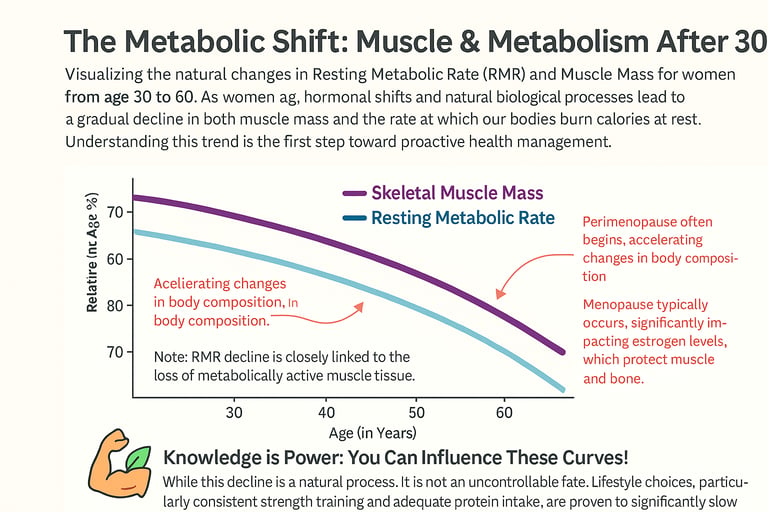Graceful Age Gains: Boost Metabolism After 40 And How to Lose Weight (Female Edition, No Crash Diets!)
Discover how to lose weight after 40 for females without extreme diets. Learn sustainable strategies to navigate hormonal shifts and boost metabolism. Start your journey today!
8/23/20255 min read


The Shifting Sands of Time: Weight Loss After 40 (Without the Extremes)As you look in the mirror today, does it seem like your face looks just a little different? Perhaps a few extra pounds have moved in where they never lived before, stubbornly ignoring your time tested tactics. Don't worry; you're not alone. The challenge of how to lose weight after 40, especially for women, has nothing to do with dieting trends; it has everything to do with understanding a changing body. When we enter our fifth decade and beyond, our physiology begins to write a new script, one that once again causes weight control to feel like a war up the mountain. But the best part is: it does not have to be a losing war. It's not a question of deprivation or painful exercise; it's about rebalancing your game plan with empathy and smarts to your changing body. We'll talk about the unique challenges you're facing and, better yet, give you effective, gentle solutions to reclaim control and feel alive again.
The Short Version
Hormonal Shifts are Real: Low estrogen and progesterone, and changing cortisol, have a significant impact on metabolism and fat storage, especially around the midsection.
Metabolism Slows Down: After 40, your resting metabolic rate slowly decreases, and you gain weight more easily while consuming the same amount of calories.
Sustainable Strategies are Key: Focus on nutrient-dense foods, focus on protein, incorporate strength training, manage stress, and focus on quality sleep instead of fad diets.
Support Your Body: Turn to gentle, natural supplements designed to power your metabolism and energy with age.
The Shifting Landscape: Why Weight Loss Changes After 40
For years, you might have relied on a calorie deficit or cutting out a food group to lose those unwanted pounds. But now, the same strategies pay less dividend. What's happening? The reason lies deep in your biology, namely for women.
Hormonal Chaos: Estrogen, Progesterone, and Beyond
At approximately age 40, most women enter perimenopause, the stage of transition before menopause. This stage is characterized by uneven levels of hormones, primarily estrogen and progesterone. Estrogen, in particular, plays a major part in fat distribution. As estrogen levels drop, fat also shifts from the hips and thighs to the belly, which leads to that annoying "meno belly."These hormonal fluctuations may also impact insulin sensitivity, leading your body to become more prone to storing fat, and impact mood and sleep, which in turn influence appetite and energy levels. It's a complex dance, and your hormones are dictating the steps.
Your Metabolism's New Rhythm
Along with hormones, your metabolism also starts to decline. After 40, our resting metabolic rate the amount of calories our bodies burn while we're not doing anything can decrease by around 5% each decade. It's not due to aging alone; it's also linked to a natural loss of muscle mass, referred to as sarcopenia. Muscle tissue is more metabolically active than fat tissue and burns more calories even while you're sleeping. So, with every lost muscle, your fire pit of calorie burn becomes smaller.
Beyond the Crash Diet: Sustainable Strategies for Lasting Change
So, if your playbook from the past isn't getting the job done, what's the new plan for how to lose weight after 40 female? It's about working on your behalf, not against you, with gentle but powerful adjustments.
Prioritize Protein and Fiber
Protein and fiber are your weight loss dynamic duo. Protein preserves muscle, keeps you full, and requires more calories to digest, which provides your metabolism with a little kick. Get a good source of lean protein at each meal chicken, fish, legumes, tofu, Greek yogurt. Fiber, in fruits, vegetables, and whole grains, also helps with satiety, digestive health, and blood sugar control. A paper in the Journal of Nutrition brought to light that boosted protein consumption will greatly contribute to weight control for middle aged adults.
Strength Training: Your Age Defying Ally
Lift weights, or else. If you're not already doing so, now is the moment to begin lifting weights. Strength training is just about the most important plan for women past 40. It addresses the issue of muscle loss head-on, constructing and preserving that metabolically active tissue. This means burning more calories at rest, even once your workout session is done. 2-3 times a week, exercising major muscle groups suffice. You don't need to become bodybuilder; light dumbbells or weight exercises will do the trick. Harvard Health Publishing confirms that preserving muscle mass is important to overall health and metabolism in older ages. [1]
The Power of Quality Sleep
When we don't sleep well, our bodies produce more of the hunger hormone, ghrelin, and less of the fullness hormone, leptin. This can lead to increased cravings, especially for high-carb, high-sugar foods. Sleep 7-9 hours of good quality sleep each night. Establish a consistent sleeping schedule, have a relaxing bedtime ritual, and limit screen time in the evenings.
Stress Management: Taming the Cortisol Monster
Life after 40 often comes with its own unique stressors. Chronic stress elevates cortisol levels, a hormone that encourages fat storage, particularly around the abdomen. Find healthy ways to manage stress: meditation, yoga, spending time in nature, or engaging in hobbies you love. Even 10-15 minutes a day can make a profound difference.
Navigating Nutrition: What to Eat (and When)
This is not a question of eliminating entire food groups; it's a matter of making good decisions and being aware of your body.
Mindful Eating, Not Restrictive Eating
Instead of cutting out entire categories of food, focus on nutrient density. Fill your plate with whole, unprocessed foods: rainbow vegetables, lean proteins, healthy fats (avocado, nuts, olive oil), and whole carbohydrates. Pay attention to the hunger and fullness cues from your body. Slow eating and savoring your food can prevent overeating and improve digestion. The Mayo Clinic notes that deliberate eating may enable you to be in charge of emotional eating habits, which are more likely to be exacerbated by life changes past age 40. [2]
Hydration's Hidden Role
Far too often overlooked, adequate hydration is vital. Water helps metabolism, will suppress appetite, and oil your systems. Sometimes you are confusing hunger with thirst. Aim for 8 glasses of water daily, more if you are exercise active.
A Product We Trust
Because our bodies naturally change after 40, sometimes we need a little extra assistance in keeping our metabolism and energy levels stable. That is why we often recommend Bio Vanish to our readers. It is formulated to work in sympathy with your own bodily physiological actions, aiding in healthy metabolism and conservation of energy, facilitating smooth passage to refinement aging. We most definitely urge you to try Bio Vanish.
Your Plan of Action
Time to take charge? This is a straightforward, actionable plan to begin your journey toward weight loss mastery at 40:
Prioritize Protein: Add a lean protein source to each meal (e.g., eggs, chicken, fish, lentils).
Embrace Strength Training: Begin with 2-3 times per week. Bodyweight exercises are an excellent place to begin.
Hydrate Consistently: Carry a water bottle and strive for at least 8 glasses of water per day.
Master Your Sleep: Get 7-9 hours of quality sleep; create a calming pre-sleep ritual.
Practice Stress Reduction: Incorporate daily mindfulness, meditation, or quiet time.
Focus on Whole Foods: Pile your plate with veggies, fruit, lean protein, and healthy fats.
Consult Your Doctor: Seek approval for any significant dietary or exercise changes from your healthcare provider, especially if you have underlying medical conditions.
Final Thoughts
Mastering weight loss at 40, or for that matter, as a woman, isn't about trying to turn back time. It's not about turning back your 20 year old clock. It's about aging wisely and using that wisdom on your body. It's about learning what your body needs now, making choices that are sustainable, and rewarding every tiny achievement. By putting muscle maintenance first, eating with intention, sleeping, and stress management, you can ride out these transitions in style, recovering your vitality, poise, and radiant sense of wellbeing. This is not about the number on the scale; it's about being strong, healthy, and resilient at every phase of your life. The best is yet to come.


Health and Wellness
Your trusted source for health and fitness.
Connect
contact: beahealth.it@gmail.com
© 2025. All rights reserved.
